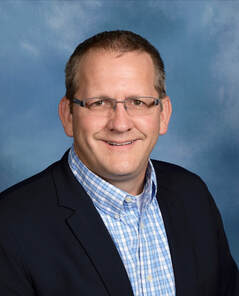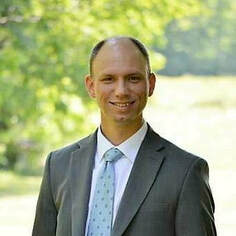One pastor, Glen Gaugh, who was lucky enough to score an invitation to the recent closed-door meeting with Betsy DeVos in Nashville, describes himself on Facebook as a minister, mental health social worker, fireworks store owner, and faith-based life coach in Jackson, Tennessee. Gaugh was invited to speak before the Senate Education Committee hearing last week in favor of the ESA voucher bill.
Another pastor, Brad Fiscus, a lay minister, director of NextGen Discipleship for the Tennessee Conference of the United Methodist Church, and founding member of Pastors for Tennessee Children, was not invited to the closed-door Betsy DeVos meeting and was not invited to speak before the Senate Committee. Instead, he delivered his speech against ESA vouchers at the Tennessee Strong Rally outside on the Capitol steps.
Interestingly, both men have ventured into politics. Gaugh ran unsuccessfully for state representative in 2016 while Fiscus is currently an elected school board member in Williamson County. Fiscus wants you to know that when he was speaking on the Capitol steps, he was doing so as an individual and a representative for Pastors for Tennessee Children. He was not speaking as a member of the Williamson County Board of Education.
In alphabetical order, we have listed the views of each pastor below...
Brad Fiscus, Pastors for Tennessee Children

My name is Brad Fiscus. I am a founding member of Pastors for Tennessee Children. I am a lay minister and Director of NextGen Discipleship for the Tennessee Conference of the United Methodist Church. I am a former public school teacher in my home state of Indiana as well as Metro Nashville Public Schools. I am a resident of Franklin, the parent of two teenagers in high school in Williamson County Schools, and a member of the Williamson County School Board.
My entire post-college year career has been dedicated to helping young people discover who they are and who they were created to be.
Pastors for Tennessee Children is a broad coalition of clergy and faith leaders from across the state of Tennessee that provides assistance to our local neighborhood and community public schools, and advocates for those schools, principals, teachers, staff and schoolchildren by supporting our free, public education system, and advancing legislation that enriches Tennessee children, families and communities.
I stand in opposition to Educational Savings Accounts, Educational Scholarship Accounts, Vouchers or any other euphemisms that have been used to promote this legislation.
My opposition is not because I have an issue with Private schools or the parent’s right to choose that for their children, my opposition is much deeper.
As a person who serves in ministry, I am called to serve all people, while some may choose to go to other congregations, denominations, or may choose not to go at all, my calling is to serve ALL people regardless of ability, ethnicity, socio-economic standing, immigration status, sexual orientation, or belief system.
God has called me to be in ministry with every person I encounter.
In the same way, public schools are required to provide a free and adequate education for ALL children in their community regardless of whether they choose to attend.
I am reminded in scripture that I am to Love the Lord my God with all my heart and with all my soul and with all my strength and with all my mind'; and, ‘ to Love my neighbor.’
While it is noble to want to provide opportunities for students from low-income, low-performing schools to increase academic performance as a means of breaking the cycles of poverty, vouchers are not the answer.
The Governor’s plan would eliminate public accountability by channeling tax dollars into private schools or home school programs that do not face state-approved academic standards.
Private schools do not publicly report on student achievement and do not meet the public accountability requirements outlined in major federal laws-- including laws which protect students with special needs. Whereas public schools are required to accept all children of all abilities in their district, private schools have the choice.
To be clear, vouchers are an easy, yet ineffective “out” for our legislators-- relieving our state leaders of their responsibility to provide oversight and accountability for public schools as demanded by our state constitution.
In each of the districts that have been targeted as under-performing, there are amazing teachers, amazing principals, incredible students. However, not every school is the same, other factors influence the ability to enhance student performance.
Many studies reveal that student academic performance does not improve by just pulling students from their low-performing district. Instead of removing students and funding from underperforming schools, we should invest more funding to provide training and resources for community development. Partnerships must be developed between community leaders, faith leaders, and school leadership.
We should invest to provide more Social Workers who have the skills to work with families caught in recurring cycles of poverty so that they might gain new skills that will provide new opportunities. A person who is struggling to keep food on their table and their family in housing does not have time to focus on ensuring their child is achieving academically. This effort is working in places like Nashville where a Community schools approach with wrap around care is working.
I believe that my alignment theologically with the United Methodist Church can be attributed to many aspects, but I am grateful for the emphasis on public education found in our Social Principles -
“The United Methodist Church believes that at a time when public education has become a political battleground, the church is called to remember, first and foremost, the well-being of all God’s children. Education is a right of all children and is affirmed by Scripture which calls us to “train children in the way they should go” (Proverbs 22:6). Furthermore, the Social Principles affirm that education “can best be fulfilled through public policies that ensure access for all persons to free public elementary and secondary schools and to post-secondary schools of their choice”
This statement continues to say, “We acknowledge the debate over whether public funds might appropriately be used to remedy the lingering effects of racial injustice in our nation’s educational system. We do not purport to resolve our differences over this issue, but we do affirm our conviction that public funds should be used for public purposes. We also caution that government aid to primary and secondary religious schools raises constitutional problems and could undermine the private schools’ independence and or compromise their religious message.”
We have been fighting this push for many years now, and we will be for years to come.
Therefore we must remain vigilant, we must remain united, we must make our voices heard, and our leaders must listen or be replaced.
There is no line in the Constitution of Tennessee that says that they should “provide for the maintenance, support and eligibility standards of a system of PRIVATE schools,” NO, it says - to “provide for the maintenance, support and eligibility standards of a system of free public schools,”
To be clear, the people pushing this legislation from outside of Tennessee might have more money than we do but they aren’t as connected as we are, they don’t have the ability to vote here like we do, they think they know us but they don’t even want to be in the same room with us, let alone the same zip code.
They pump money into our legislative system attempting to dictate all of the issues that we face especially how we provide the provision of Education for the public good. They desire to dictate how we should live, what we should learn, where we should learn, who we should love, and how we should engage in public discourse. While they work in private influencing our elected officials through threats of loss of elections, or loss of influence in decision making.
We are the ones who make those decisions, we are the ones who decide who gets to represent us here in the General Assembly, and we must be bold enough to stand up to their threats, be bold enough to support those legislators who truly listen to the desires of Tennesseans instead of those who offer to pay for their re-elections.
In closing may we be guided by the simple rules that the founder of Methodism, John Wesley, called us to remember - 1. Do Good, 2. Do No Harm, and 3. Stay In Love with God. As Bishop Rueben Job said, "The rules are simple, but the way is not easy. Only those with great courage will attempt it, and only those with great faith will be able to walk this exciting and demanding way.”
Glen Gaugh, Tennessee Federation for Children

School choice: A worthwhile opportunity
Choice is typically considered to be a good thing. Why is school choice controversial?
With middle school looming large, we were concerned about the quality of education my sixth-grader would receive. We also didn’t feel safe sending him to the middle school in our zone. As a public school graduate, I used to believe public school would meet our children’s needs. But with ludicrous curriculum (or lack of), burdensome testing, and no shared sense of decency, the concerns mounted and the options sank.
We became a homeschool family this school year, but only for our sixth-grade scholar. Our youngest son is still doing well in his public elementary school, and we are optimistic that he is making gains with his current teacher.
These are the choices every family should have the opportunity to make.
I am amazed at those who believe mainstreaming school choice through initiatives like Education Savings Accounts would destroy public schools. If you are truly concerned about student outcomes, stop diverting 50 percent of education dollars from the classroom to administration and administrative salaries. Focus on individual achievement rather than aggregate test scores. Focus on fundamentals.
School choice leads to better outcomes for individual students through higher graduation rates, lower incarceration rates, and higher employment rates. I know it makes it harder for government to measure and politicians to take credit when parents are able to do education in whatever way works best. But in the long run, individual liberty will create a stronger society.
Glen Gaugh
Jackson

